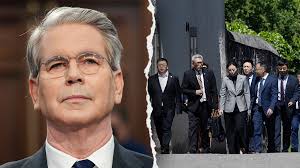The 'Fox & Friends Weekend' co-hosts engaged in a lively discussion about President Donald Trump's recent remarks on the ongoing trade negotiations with China. Amidst a backdrop of escalating tensions and economic uncertainties, Treasury Secretary Scott Bessent embarked on high-level discussions in Switzerland to navigate the complex terrain of tariffs and trade policies.
President Trump took to Truth Social to announce what he deemed as "great progress" during the weekend negotiations with China. The meeting, held in Geneva, Switzerland, brought together key players from both the U.S. and Chinese delegations, including Treasury Secretary Scott Bessent. Trump highlighted that significant discussions had taken place and substantial agreements had been reached during the lengthy talks that ensued. Despite the intensive dialogue that lasted over 10 hours, no major breakthrough was officially declared. However, the negotiations are set to continue, indicating a commitment to finding common ground in the midst of economic uncertainties.
The administration's stance on tariffs had a significant impact on the trade dynamics between the U.S. and China. Notably, a round of tariffs was announced on April 2, followed by a dramatic 145% tariff imposed on Chinese goods. In a tit-for-tat move, China reciprocated by raising tariffs on U.S. goods to 125%, highlighting the escalating trade tensions between the two economic powerhouses.
President Trump's rhetoric has been consistent in advocating for fair tariffs that could potentially address the substantial trade deficit and bolster domestic manufacturing jobs. His unwavering commitment to a 10% baseline tariff stands firm, despite recent developments surrounding trade deals with other countries. The strategic imposition of tariffs is seen as a tool to balance trade relations and curb the trade deficit that has been a longstanding concern for the U.S. economy.
Treasury Secretary Scott Bessent echoed Trump's sentiments by highlighting the potential repercussions of the tariffs on the Chinese economy. Bessent emphasized that the tariffs could potentially result in significant job losses for China, making the current tariff structures unsustainable in the long run. With a keen focus on the economic impact and implications of tariffs, the discussions between the U.S. and Chinese delegations hold immense significance for the global economic landscape.
As the negotiations unfold, stakeholders are closely monitoring the developments between the two economic giants. The intricacies of trade agreements and tariff structures are at the forefront of the discussions, with implications that extend beyond economic realms into geopolitical considerations. The outcome of these negotiations could have far-reaching consequences for global trade dynamics and economic stability.
In conclusion, the ongoing trade negotiations between the U.S. and China represent a critical juncture in the complex landscape of international trade policies. With both sides expressing a desire for constructive dialogue and mutual understanding, the discussions hold the potential to reshape trade relations and mitigate economic uncertainties. As the world watches these developments unfold, the outcome of these negotiations could mark a significant turning point in the global economic landscape.


